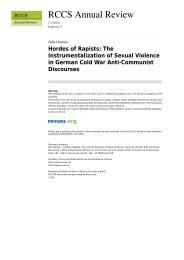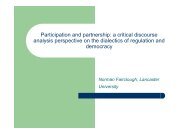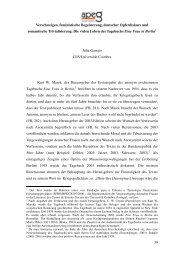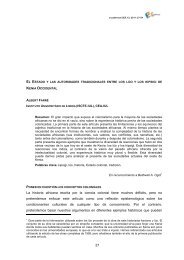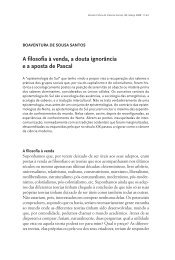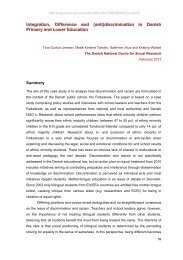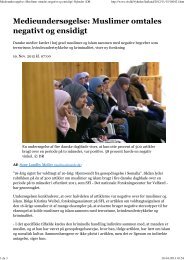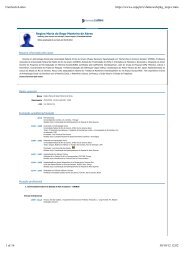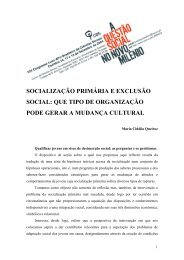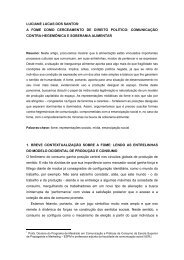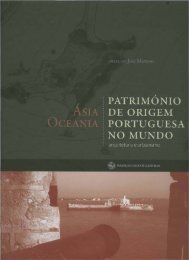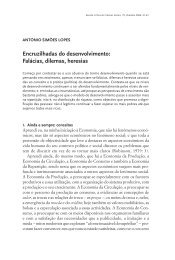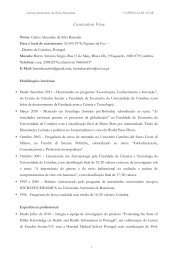Analysis of Integration Policies and Public State-Endorsed ...
Analysis of Integration Policies and Public State-Endorsed ...
Analysis of Integration Policies and Public State-Endorsed ...
You also want an ePaper? Increase the reach of your titles
YUMPU automatically turns print PDFs into web optimized ePapers that Google loves.
Working paper produced within the TOLERACE project<br />
policy to politicize culture; the continuity <strong>of</strong> the nation-state is predicated by identity<br />
projects which present culture in terms <strong>of</strong> being politically necessary, where some<br />
cultures are beneficial <strong>and</strong> others are not (Mouritsen, 2006, 73; Hedet<strong>of</strong>t, 2003); cf. the<br />
Declaration on active participation. Furthermore a culturalization <strong>of</strong> politics is prevalent<br />
in the sense that political values are talked about <strong>and</strong> represented as ‗culture‘ <strong>and</strong><br />
linked to nationally specific historical traditions or ways <strong>of</strong> life (Mouritsen, 2006: 73;<br />
Sjørslev, 2007); e.g. the Danish democracy <strong>and</strong> welfare state. Culture is thus central in<br />
the underst<strong>and</strong>ing <strong>and</strong> debate <strong>of</strong> integration <strong>and</strong> some ‗cultures‘ are equated with<br />
problems. In 2003, the government presented a new vision <strong>and</strong> strategy for integration<br />
(Regeringens vision og strategier for bedre integration; Danish Government, 2003).<br />
The strategy outlines:<br />
A number <strong>of</strong> integration problems that can be tracked to the circumstance that many people<br />
with foreign background for obvious reasons have other conceptions <strong>of</strong> right <strong>and</strong> wrong<br />
than the conceptions prevalent in Denmark […] It goes without saying that the difficulties<br />
pointed at not always are <strong>of</strong> a character that can be removed by law changes <strong>and</strong><br />
administration. Rooted habits <strong>and</strong> views <strong>of</strong> immigrants <strong>and</strong> refugees or <strong>of</strong> Danes cannot be<br />
changed by legislation. Legislation can however be important since it by this means is<br />
possible to express the commonly accepted conceptions <strong>of</strong> values that should characterize<br />
society (Danish Government 2003: 12; our translation)<br />
A dividing line is drawn between ‗Them‘ – (immigrants/refugees) <strong>and</strong> ‗Us‘ (the Danes).<br />
The problems <strong>of</strong> integration are ascribed to ‗their‘ differing values which must be<br />
altered in order to solve the problems; that is to make ‗Them‘ underst<strong>and</strong> <strong>and</strong> accept<br />
‗Our‘ values; values that should characterize society. Qua their cultural backgrounds,<br />
immigrants are stereotyped as carriers <strong>of</strong> problems; ―a symbolic frontier between the<br />
‗normal‘ <strong>and</strong> the ‗deviant‘, the ‗normal‘ <strong>and</strong> the ‗pathological‘, the ‗acceptable‘ <strong>and</strong> the<br />
‗unacceptable‘, what ‗belongs‘ <strong>and</strong> what does not‖ (Hall, 1997: 258) is outlined.<br />
Despite the heavy focus on culture <strong>and</strong> values, it is rarely made explicit what is<br />
meant hereby. Instead, the debates revolve around abstract common values such as<br />
personal autonomy, egalitarianism <strong>and</strong> democratic participation, <strong>and</strong> ―even debates<br />
that do refer to ‗the Danish way‘ hardly scratch the surface <strong>of</strong> what actually constitutes<br />
those ‗accumulated habits <strong>and</strong> expectations‘ <strong>of</strong> Danish political culture‖ (Mouritsen,<br />
2006: 85; original italics). This means that the dividing line between ‗Them‘, the<br />
immigrants, <strong>and</strong> ‗Us‘, the Danes/Danish society, remains undefined in the same way as<br />
the concept <strong>of</strong> integration (as process or goal) remains rather undefined. The dividing<br />
line is relative in the sense that it can <strong>and</strong> will be changed (by ‗Us‘/the majority) as soon<br />
as ‗They‘ try to pass it. This is what makes the concept <strong>of</strong> integration paradoxical (Azar,<br />
2001: 69). The constant changes <strong>of</strong> the legislation on integration illustrate this paradox.<br />
60



